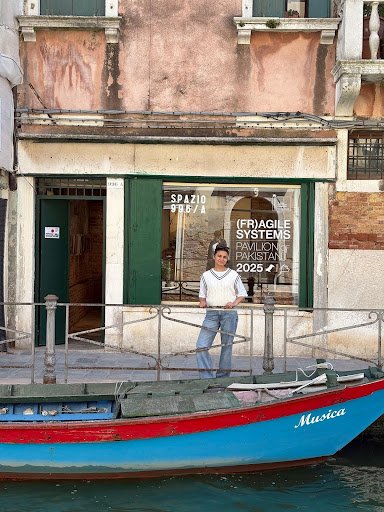I belong to a land of mountains, Hunza valley where rivers and the mountains tells the stories of resilience of our ancestors and where culture lives in food, language, and spirit of our traditional everyday events
I started my professional journey in 2014 and worked in various regions of Pakistan from mountains of northern Pakistan to the villages of central Punjab. My work has taught me resilience and the tenacity of women who continue to build, create, and contribute against the odds.
Destiny brings me to Venice, the historic city of canals. I came here with a bit of uncertainty in my heart because of no familiarity with language and culture, but somewhere in my heart I had a belief that the beginning of something new, how fragile they look, is worth trying.
I believed in myself and worked against the odds with support of my family, and destiny led me to the most prestigious international art event of the world “La Biennale Di Venezia.” I started working as part of the creative team for French Canadian artist Kapwani Kiwanga and later worked as cultural mediator for the same art installation at Canada Pavilion at Venice Biennale 2024.
This was a life changing experience working between culture, translating stories and building connections. Every day at the Biennale reaffirmed my belief that art knows no borders, and that cultural dialogue, when rooted in mutual respect, can reshape how we see one another — and ourselves.
In early January, I came to know that a group of architects and researchers had made it to the Venice Architecture Biennale 2025. It was a moment of great pride, having Pakistan’s first ever Pavilion at a global platform, a platform to tell the story of our land, fragility and resilience.
The installation, titled “Fr(agile) Systems”, is not just an architectural intervention — it’s a call to consciousness. It reflects the fragile interconnections between the environment, economy, society, and politics, particularly for countries like Pakistan, which contribute less than 1% to global greenhouse gas emissions, yet face disproportionate climate disasters. Heatwaves, glacial melt, and devastating floods continue to test the limits of our resilience.
At the heart of the pavilion is rock salt, sourced from Pakistan — a material that dissolves, reforms, and transforms within the Venetian humidity. It’s a poetic representation of adaptation under pressure, of resilience shaped by shifting climates, and of the cultural and ecological knowledge held within materials often taken for granted.
But perhaps the most remarkable part of this story is how it was made possible.
This pavilion was not state-sponsored. It was the result of sheer vision, grit, and dedication from a team that believed in the power of storytelling through architecture and art. With no government support, the curatorial team raised funds independently, coordinated logistics across borders, and built something truly historic with the help of private supporters, institutions, and the global artistic community.
The curators — Anique Azhar, Arsalan Rafique, Ayesha Sarfraz, Bilal Kapadia, Madeeha Merchant, Mustafa Mehdi, Salman Jawed, and Sami Chohan — have achieved what many would call impossible. Their collaborative work and commitment have opened the door for Pakistan to be seen at such an important platform at global level.
Fr(agile) Systems is more than an installation. It is a site of encounter. A moment of reflection. A mirror held up to the global imbalance that defines our times — and an invitation to imagine new systems built not on extraction and inequality, but on empathy, adaptation, and mutual care.
The presence of the Pakistan Pavilion at the Biennale is a profound act of cultural diplomacy, made possible only because of our curator’s effort and dedication. It offers the world an entry point into the layered, complex, and beautiful realities of our nation — beyond stereotypes, beyond crisis headlines. It speaks in the universal language of form, texture, and space.
As a Pakistani woman representing the country as part of the national pavilion at Biennale 2025, I am filled with pride. In this convergence of place and purpose, I see what is possible when art becomes the meeting point of cultures, when imagination becomes a tool for resilience, and when fragile systems give way to powerful transformations.
I invite you all to visit the Pakistan Pavilion at the Venice Architecture Biennale 2025, to witness Fr(agile) Systems up close, and to engage with the stories it holds. Your presence and support not only honor this milestone, but also help amplify the voices, visions, and creativity emerging from Pakistan. This is not just our pavilion — it is our voice, our presence, our story of resilience to share with the world.
Anila Hayyat
Anila Hayyat is an environmentalist and exhibition manager at the Pakistan Pavilion, Venice Biennale.



